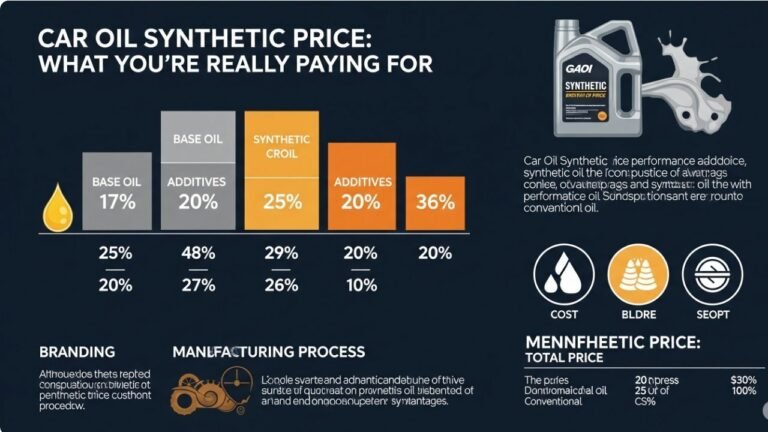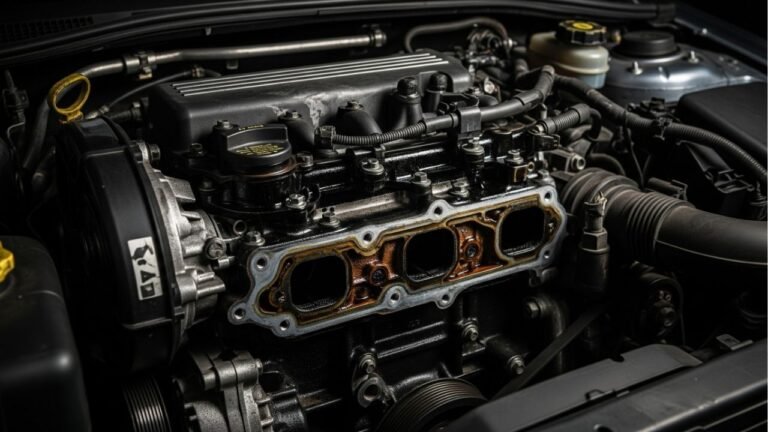Why Does My Car Go Through Oil Fast?

We’ve all been there.
You just changed your oil last month. You check the dipstick, and—bam!—it’s already halfway to low. You think, “Why does my car go through oil fast?” You’re not alone in wondering. It’s one of those frustrating things that catches drivers off guard—like realizing your favorite coffee shop ran out of your regular order.
When your car is consuming oil too quickly, it doesn’t always mean disaster. But it’s a red flag that shouldn’t be ignored. Whether you’re driving an old hand-me-down sedan or a turbocharged beast, understanding the reasons behind fast oil loss is essential. And here’s the best part—I’m not going to bore you with robotic technical jargon. We’ll explore real stories, practical advice, and even some mechanic insights that feel more like a chat over tea than a textbook.
Let’s break down why your car might be drinking oil like it’s at an all-you-can-guzzle buffet—and what you can do to stop it.
Engine Age: The “Senior Citizen” Factor
Think of your engine like a grandparent who’s been working hard for decades. Over time, wear and tear add up. Seals get loose. Piston rings wear out. Oil starts sneaking into places it shouldn’t, like the combustion chamber.
Older engines naturally burn more oil. It’s kind of like how older knees creak more. The parts still work, but not like they used to.
-
Piston rings can wear out, letting oil slip past into the cylinders.
-
Valve seals harden and crack, causing leaks.
-
Gaskets lose flexibility, allowing oil to seep through.
Personal Note:
I once drove a ‘99 Honda Accord with 240,000 miles on it. I loved that car like an old friend, but it drank oil like a thirsty elephant. I had to top it off every 500 miles or so. It wasn’t leaking—just burning it slowly. The mechanic said, “It’s the rings, man. They’re tired.” And honestly, I couldn’t even be mad. The car had done its time.
Quick Tips:
-
Monitor your oil level weekly if your car has over 150k miles.
-
Use high-mileage motor oil. It’s thicker and better for older engines.
-
Consider getting a compression test to check for worn piston rings.
Leaks That Hide in Plain Sight
Not all leaks leave a puddle on your driveway. Some are sneaky—like a slow drip behind the engine block or onto a hot exhaust pipe where it burns off before you see a trace.
So when you ask, “why does my car go through oil fast?”—you might just be dealing with a leaky seal or gasket.
Signs You Might Have a Leak:
-
Burning oil smell after driving.
-
Smoke from the engine bay.
-
Dirty engine components around seals or bolts.
Here’s a quick breakdown in table form:
| Leak Location | What to Look For | Possible Fix |
|---|---|---|
| Valve Cover Gasket | Oil on top of engine | Replace gasket ($100–$300) |
| Oil Pan Gasket | Oil under the car | Reseal oil pan ($150–$400) |
| Rear Main Seal | Oil near transmission | Major job, $$ ($500+) |
| Camshaft Seal | Engine smells hot | Inspect & replace ($200–$600) |
A Personal Reminder:
When I got my first Subaru, I noticed a weird burnt smell after driving. I thought maybe the neighbor’s grill was always on. Turns out, oil was leaking onto the exhaust manifold and frying itself. The culprit? A cracked valve cover gasket. Once replaced, the smell—and the oil loss—stopped immediately.
Driving Habits That Speed Things Up
Your right foot might be doing more damage than you think.
Aggressive driving—revving the engine, rapid acceleration, constant highway speeds—can raise engine temperatures. This causes oil to break down faster, or even burn off completely, especially in turbocharged or high-performance engines.
What This Looks Like:
-
You’re topping off every 1000 miles or less.
-
You often see bluish smoke from your tailpipe when you floor it.
-
Your oil smells burnt at dipstick checks.
Helpful Tip:
Take it easy on the gas pedal. Smooth acceleration and lower RPMs help reduce oil consumption.
The Wrong Type of Oil
You might think oil is oil. But using the wrong viscosity or low-quality brand can cause your engine to consume oil faster than it should. It’s like putting water in a milkshake machine—it’ll disappear in no time.
For Example:
-
Using 5W-20 when your car needs 10W-40 can lead to oil thinning, especially in hot climates.
-
Some synthetic oils, while excellent, are too “slippery” for older engines and sneak past worn seals.
What You Should Do:
-
Always check the owner’s manual for the right viscosity.
-
Use brand-name oils that meet your vehicle’s specification (e.g., API SN, ACEA).
-
Try high-mileage formulations if your car is over 75,000 miles.
Bullet Summary:
-
Wrong oil = faster consumption.
-
Always match oil to climate + mileage.
-
Cheap oil isn’t worth the future repair cost.
Faulty PCV Valve: A Tiny Part with a Big Job
The Positive Crankcase Ventilation (PCV) valve might sound fancy, but its job is simple—release pressure and gases from your engine’s crankcase. If it fails, oil can be sucked into the intake manifold and burned along with fuel.
It’s one of the most overlooked reasons why your car may go through oil fast.
Symptoms of a Bad PCV Valve:
-
Rough idling.
-
Oil around the air intake.
-
Check Engine Light (often with codes like P0171).
Replacing a PCV valve usually costs under $50 and can make a huge difference.
Turbocharged Engines: Power Comes with a Price
Let’s be real—turbo engines are fun. They give that satisfying push when you accelerate. But all that power requires more lubrication and heat resistance.
Turbo engines often run hotter, and the oil flows faster to cool and protect the turbo. Naturally, some of it burns off quicker than in standard engines.
What You Need to Know:
-
Turbo engines can use up to 1 quart every 1,000 miles (check your manual—some manufacturers even call this “normal”).
-
Synthetic oil is mandatory for most turbo setups.
-
Never skip oil changes with a turbo car—it leads to sludge buildup and turbo failure.
Internal Engine Damage: When Things Get Serious
This is the scary one.
If your car is losing oil extremely fast and blowing smoke out the exhaust—especially blue or gray smoke—you might be dealing with a blown head gasket, cracked piston, or damaged cylinder walls.
Warning Signs:
-
Oil and coolant are mixing (milky oil).
-
Overheating often.
-
Poor engine performance.
If you suspect internal damage, stop driving and get a mechanic’s opinion immediately. These repairs are expensive, but catching them early can prevent total engine failure.
Oil Burn-Off: Natural, But Sometimes Too Fast
Yes, it’s true. Even in a healthy engine, some oil burns off during normal combustion. The problem arises when it burns off too quickly.
If you ever notice your dipstick reading low even though you don’t see a leak or smoke, this may be the issue. Think of it like steam from a boiling kettle—it’s gone before you even realize it was there.
What Causes Faster Burn-Off?
-
High RPM driving.
-
Long highway commutes in hot weather.
-
Low-quality or thin motor oils.
Even new engines can experience oil loss if subjected to extreme driving or improper oil changes. Manufacturers sometimes even build in some level of oil burn—especially in performance or European vehicles.
What You Can Do:
-
Don’t ignore small losses. Monitor your levels weekly.
-
Use the correct oil viscosity for your climate and engine.
-
Never skip oil changes—fresh oil burns slower.
Oil Filter Problems: The Hidden Culprit
An old or damaged oil filter might not seem like a big deal, but it can lead to oil pressure issues, leaks, or unfiltered contaminants flowing back into the engine.
And if oil isn’t being filtered and circulated properly, it can either build up and leak or get burned faster.
Warning Signs:
-
Oil light flickering.
-
Ticking noises from the engine.
-
A filter soaked in oil when removed.
Pro Tip:
Always use a high-quality oil filter during every oil change. And if your mechanic “forgot” to change it last time, it’s okay to speak up. This tiny part protects your engine’s entire oiling system.
Engine Overheating: Cooking Oil in a Bad Way
Just like how oil in a pan burns if it gets too hot, your engine oil can burn or evaporate if your engine constantly overheats.
Heat breaks down oil’s protective properties. It thins it out and causes rapid consumption, especially under the hood in city traffic or during summer road trips.
Causes of Overheating:
-
Faulty thermostat.
-
Clogged radiator.
-
Low coolant levels.
If your temp gauge is dancing above halfway regularly, your oil might be burning faster than it should.
Using Oil Additives Without Understanding Them
A lot of drivers use additives hoping they’ll improve oil performance. But using the wrong type—or mixing too many—can mess with oil viscosity, create foam, or reduce oil’s ability to cling to engine parts.
This results in more burn-off, breakdown, or even premature engine wear.
What to Know:
-
Stick to manufacturer-recommended oil and additive types.
-
Avoid over-the-counter “miracle” solutions promising instant fixes.
-
If in doubt, talk to a trusted mechanic before adding anything.
Poor Maintenance Habits: Neglect Has a Price
Neglecting routine maintenance is one of the top reasons people end up asking, “why does my car go through oil fast?”
Letting oil changes slide, ignoring engine noises, or skipping inspections allows small problems to snowball.
It’s like ignoring a slow drip under the sink—eventually, the floor’s going to rot.
Smart Maintenance Habits:
-
Change your oil every 3,000–5,000 miles, or as recommended.
-
Check oil levels every 2 weeks—especially before long trips.
-
Use a funnel to avoid spills while adding oil.
Simple Prevention Tips to Keep Your Oil Where It Belongs
Want to slow down oil usage and avoid engine trouble? Here are easy and effective habits you can follow:
-
Use the correct oil grade (match your car’s manual).
-
Warm up your engine on cold mornings.
-
Avoid hard acceleration right after starting your car.
-
Stick to a routine oil change schedule.
-
Check the dipstick every 500–1,000 miles.
-
Get engine leaks checked at the first sign of a smell or spot.
FAQ: Why Does My Car Go Through Oil Fast?
Here are some frequently asked questions, answered simply and clearly.
Q1: Is it normal to add oil between changes?
Yes, but it depends on your car’s age and engine type. Older or high-performance engines may naturally use more oil. If you’re adding more than 1 quart every 1,000 miles, that’s excessive.
Q2: My car isn’t leaking—so where’s the oil going?
Oil can burn off internally due to worn piston rings, valve seals, or high heat. It doesn’t always leak externally. A compression test can help diagnose internal oil burning.
Q3: Does synthetic oil reduce oil consumption?
In many cases, yes. Synthetic oil resists high temperatures better and burns off slower. But for older engines, synthetic oil might seep through worn seals faster than conventional oil.
Q4: How can I tell if my engine is burning oil?
Watch for blue smoke from the tailpipe, a burnt oil smell, or frequent top-offs without visible leaks. A spark plug check can also reveal signs of oil fouling.
Q5: Can driving style impact oil use?
Absolutely. Fast acceleration, high speeds, and heavy loads heat your engine faster and lead to higher oil usage. Gentle driving helps preserve oil and engine health.
Final Thoughts: Don’t Ignore the Signs
Let’s face it—oil is your engine’s lifeblood. If it’s going somewhere fast, you need to find out why.
Whether it’s age, habits, leaks, or bad parts, your car is telling you something. Ignoring oil loss can lead to engine damage, overheating, or total failure. But staying informed puts you ahead of the curve.
From my personal experience, one of the best things I did was start checking my oil every Sunday morning—like a ritual. I caught small leaks before they got big. I understood my engine better. And I saved thousands in repairs.
So next time you wonder “why does my car go through oil fast,” remember—you’ve got the knowledge now. And that’s half the battle won.






